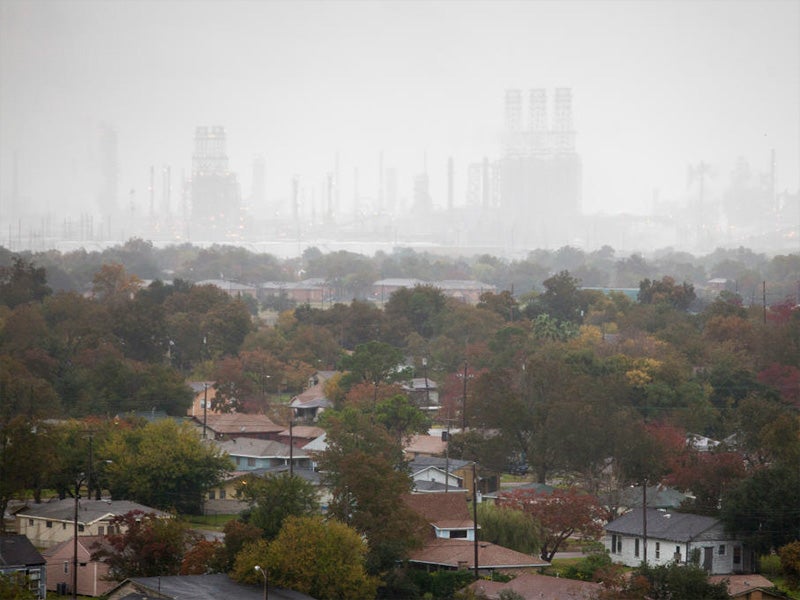Environmental Justice Office Could be Shuttered by Proposed EPA Cuts
In its proposed 2018 spending bill, Congress could scrap the EPA office charged with addressing racial and income disparities in environmental protections.

This page was published 8 years ago. Find the latest on Earthjustice’s work.
Now that Congress is in full swing after its summer recess, its members are deciding on whether to move ahead with deep cuts to the Environmental Protection Agency in the proposed 2018 spending bill. Lawmakers bought themselves a little more time this week with a temporary extension of the current budget, but a decision must happen soon.
One of the EPA cuts would completely defund the Office of Environmental Justice (OEJ). The EPA established this office in 1992 to address racial and income disparities in environmental protections. Scrapping funding for the environmental justice program is entirely inadequate given the complex environmental justice challenges facing communities across the country.
OEJ has distributed $24 million in grants to 1,400 communities, providing valuable seed money for infrastructure, cleanup and revitalization efforts that change lives across the country. Along with the tireless efforts of grassroots community groups, the office’s work has helped push the agency to begin considering environmental justice impacts in its approach to regulation.
Closing the office and backtracking on this work would worsen the present injustices. As of now, people of color are nearly twice as likely as white Americans to live within a fenceline zone of an industrial facility. Water contamination, toxic chemical exposure, air pollution and the impacts of climate change all have outsized effects on already overburdened communities and receive significantly less media and government attention than when these hazards fall on wealthier white counterparts.
In July, the House Appropriations Committee approved the 2018 spending bill for the EPA that cuts $506 million from its budget. The reductions will further jeopardize our nation’s land, air and water protections. It slashes crucial EPA programs, including state grantmaking programs, Puget Sound and Chesapeake Bay cleanups, and funding for regulatory enforcement. The bill set up provisions to delay implementation of EPA’s 2015 ozone standard and to expedite Trump’s efforts to repeal the Clean Water Rule, among others.
As for the Office of Environmental Justice, the bill states: “Environmental justice will continue to be supported in the work done at the EPA, when applicable. Environmental justice work impacting the entire state agency will be incorporated into future policy work within the Integrated Environmental Strategy program, which is a part of the EPA’s Office of the Administrator.”
The federal priority on environmental justice was codified in 1994 by Executive Order 12898, signed by President Clinton, which required all agencies to “identify and address the disproportionately high and adverse human health or environmental effects of their actions on minority and low-income populations, to the greatest extent practicable and permitted by law.”
Complying with EO 12898 will be a tremendous challenge for the EPA without the guidance and partnerships of the Office of Environmental Justice. Dismantling the Office of Environmental Justice and its funding programs while reducing state and federal ability to enforce environmental regulations will leave our most vulnerable communities severely under-resourced and more impacted by increased pollution.
Earthjustice will stand by communities left behind by this ill-conceived budget and will continue to work with our partners to fight for stronger environmental protections. Our Policy and Legislation team has been engaging with members of Congress around improving funding levels and blocking the numerous anti-environment policy riders that were included in the budget bill.
You can support Earthjustice and our partners by contacting your representatives and telling them to fulfill their duty to fund our government agencies. While it’s difficult to predict what the final budget will look like, it’s critical that we stand up to defend EPA’s lifesaving programs every step of the way.
Earthjustice’s Washington, D.C., office works at the federal level to prevent air and water pollution, combat climate change, and protect natural areas. We also work with communities in the Mid-Atlantic region and elsewhere to address severe local environmental health problems, including exposures to dangerous air contaminants in toxic hot spots, sewage backups and overflows, chemical disasters, and contamination of drinking water. The D.C. office has been in operation since 1978.